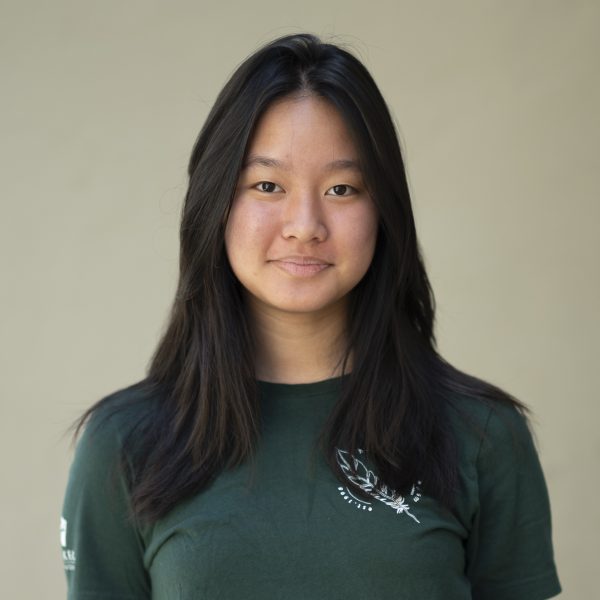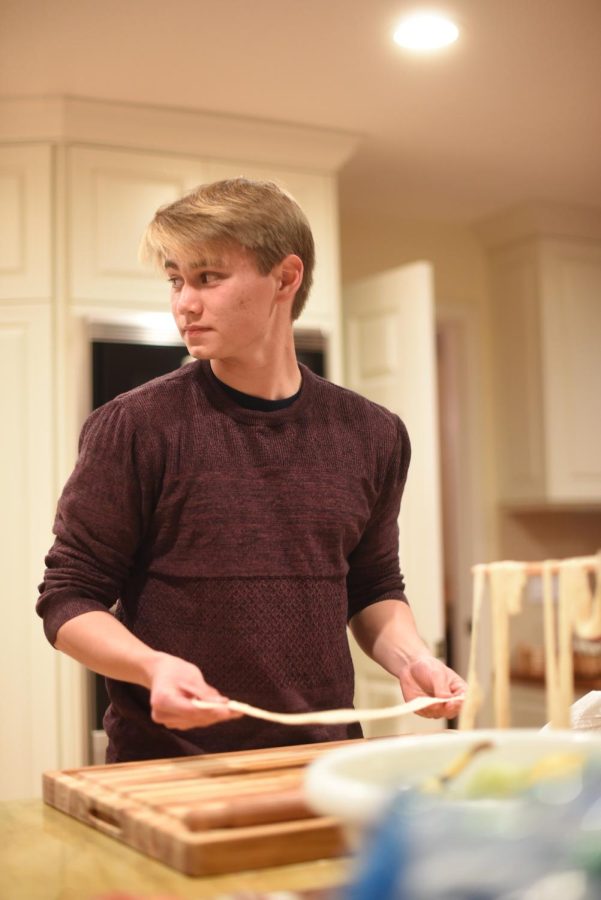Humans of Harker: Recipe for reflection
Justin Fung embraces personal growth as he explores different aspects of his cultural heritage
“I definitely feel that stretch and pull between the two parts of me, and that’s a difficult part of being biracial — being able to connect with the part of you that’s probably less prominent in the world that you live in. Sometimes it feels like you never belong. But it also feels like you can make your own identity because you can be so many different things at once,” Justin Fung (12) said.
Justin Fung (12) fondly describes memories of watching his grandparents cook traditional Chinese dishes such as lo bak go, a type of turnip cake. Justin would eagerly observe them shred and boil daikon radishes before mixing in rice flour and other ingredients. Next, he would watch as his grandparents steamed the cakes and then lightly pan-fried them, the oil sizzling gently. These dishes later became Justin’s first favorites.
Justin first became interested in cooking as a child when he connected with his grandparents through their culinary traditions. From there, he began branching out into cooking other foods, such as Italian and Japanese cuisine.
“[Cooking] is my art,” Justin said. “You can experiment and try out new things. It’s a way of expressing myself because I never really use recipes. I just go with what I’m feeling, my intuition. And that makes it special because even if it sucks or doesn’t taste the way you want it to taste, you just think, ‘Okay, that’s just what happened this one time, next time it’ll be completely different.’
Justin enjoys exploring different techniques and ingredients through trial-and-error instead of using a recipe; he abides by the belief that no two dishes will ever turn out exactly the same. Justin draws upon this wisdom from his paternal grandmother.
“You don’t have to be very precise in cooking,” Justin said. “I like mixing and matching techniques — I don’t measure stuff when I’m cooking. It’s more fun for me, knowing that I’ll never cook something the same way twice.”
Justin cherishes the moments of solitude that cooking provides as he tests new recipes and cooking techniques.
“Most of the cooking I do alone, which is actually something nice,” Justin said. “I enjoy cooking with other people, especially when I’m with a big group, but a lot of good cooking comes when you’re alone, and you don’t have to worry about what anyone else thinks.”
Besides experimenting with recipes for personal enjoyment or to share with friends, Justin also looks to cooking as a way to explore his cultural heritage. Justin has explored many traditional Chinese dishes such as daikon radish cake, scallion pancakes, various dimsum foods and handmade noodles.
As someone who identifies as biracial, he connects with all of his cultural legacies — Chinese and Scandinavian — through their rich culinary histories. Rather than forcing himself to align with one identity, Justin chooses to connect with both sides of his family.
“I don’t speak any family languages, so [cooking] is a good way for me to connect with my past and my heritage,” Justin said. “Being mixed race is a very interesting experience … especially because I have blonde hair, I look pretty white, but then my last name is Chinese. It’s hard to put a label on myself as one thing or another.”
Justin appreciates both the moments when he cooks by himself and gives free rein to his culinary creativity as well as the opportunities to connect with his family. Similarly, in soccer, he enjoys both the aspect of self-improvement and that of team bonding and spirit.
Justin first started playing soccer when he was 4 years old and later joined the De Anza Force Soccer Club as a 16-year-old. Now, Justin plays for both his club team and the Harker team, where he enjoys pushing himself to continually improve alongside his other teammates.
“I like the competitiveness [of soccer],” Justin said. “It’s a nice place to work hard to get better … and see results … [while] playing a team sport. I train a lot with [club] teammates; we meet up, play on Friday nights and practice together. I like putting in the extra work because it feels rewarding.”
Ishaan Mantripragada (12), who plays soccer with Justin at both the De Anza Force and Harker, describes his experiences with Justin as a friend both on and off the field. The two met in sixth grade and initially connected through playing soccer together.
“My first impression [of Justin] was that he was quiet … but really respectful, really polite and really likable,” Ishaan said. “Since then, he’s definitely opened up more, but he still maintains that politeness and respectfulness. He always has a smile on his face.”
Besides serving as an outlet for Justin to compete alongside his friends, soccer has also influenced Justin’s philosophy on personal growth.
“The biggest difference between players who make it and players who don’t is the players who make it are willing to learn from and accept mistakes, and they work harder and work to address those failures,” Justin said. “That’s helped a lot in the rest of my life because in soccer it’s very easy to compare yourself to other people. So that has helped me a lot with motivation and my work ethic.”
Another way Justin has explored his cultural heritage was through historical research as co-founder and editor-in-chief of Herald, Harker’s historical research journal.
“The most important thing about history is its ability to inspire conversation, and to get people to think about what’s happened in the past and make informed decisions about how we can affect the present first and then the future,” Justin said. “I am proud of what we’ve done [in] highlighting or showcasing student work.”
Arthur Kajiyama (12) reflects on the way that Justin makes the best out of every situation.
“He likes to make jokes and make the best of the situations,” Arthur said. “And he’s very determined as well. I haven’t seen him back down from challenges. He’s always ready to put in all his effort. Even when he has a lot of stuff on his plate, he’s still willing to help out and go the extra mile to do something for me, for other people.”
Whether it is through cooking, soccer or academic pursuits, Justin seeks to connect not only with his friends and family but also with his past and his heritage. As he embraces his various interests and his cultural background, Justin has come to cherish the diversity of these various passions and family histories.
“I definitely feel that stretch and pull between the two parts of me, and that’s a difficult part of being biracial — being able to connect with the part of you that’s probably less prominent in the world that you live in,” Justin said. “Sometimes it feels like you never belong. But it also feels like you can make your own identity because you can be so many different things at once.”

Michelle Wei (12) is a co-managing editor for Humans of Harker, and this is her fourth year on staff. Through her writing, she hopes to explore topics...

Esha Gohil (12) is the co-editor-in-chief of Humans of Harker and the photo editor of Harker Aquila. This is her fourth year on staff, and this year she...


















![“[Building nerf blasters] became this outlet of creativity for me that hasn't been matched by anything else. The process [of] making a build complete to your desire is such a painstakingly difficult process, but I've had to learn from [the skills needed from] soldering to proper painting. There's so many different options for everything, if you think about it, it exists. The best part is [that] if it doesn't exist, you can build it yourself," Ishaan Parate said.](https://harkeraquila.com/wp-content/uploads/2022/08/DSC_8149-900x604.jpg)




![“When I came into high school, I was ready to be a follower. But DECA was a game changer for me. It helped me overcome my fear of public speaking, and it's played such a major role in who I've become today. To be able to successfully lead a chapter of 150 students, an officer team and be one of the upperclassmen I once really admired is something I'm [really] proud of,” Anvitha Tummala ('21) said.](https://harkeraquila.com/wp-content/uploads/2021/07/Screen-Shot-2021-07-25-at-9.50.05-AM-900x594.png)







![“I think getting up in the morning and having a sense of purpose [is exciting]. I think without a certain amount of drive, life is kind of obsolete and mundane, and I think having that every single day is what makes each day unique and kind of makes life exciting,” Neymika Jain (12) said.](https://harkeraquila.com/wp-content/uploads/2017/06/Screen-Shot-2017-06-03-at-4.54.16-PM.png)








![“My slogan is ‘slow feet, don’t eat, and I’m hungry.’ You need to run fast to get where you are–you aren't going to get those championships if you aren't fast,” Angel Cervantes (12) said. “I want to do well in school on my tests and in track and win championships for my team. I live by that, [and] I can do that anywhere: in the classroom or on the field.”](https://harkeraquila.com/wp-content/uploads/2018/06/DSC5146-900x601.jpg)
![“[Volleyball has] taught me how to fall correctly, and another thing it taught is that you don’t have to be the best at something to be good at it. If you just hit the ball in a smart way, then it still scores points and you’re good at it. You could be a background player and still make a much bigger impact on the team than you would think,” Anya Gert (’20) said.](https://harkeraquila.com/wp-content/uploads/2020/06/AnnaGert_JinTuan_HoHPhotoEdited-600x900.jpeg)

![“I'm not nearly there yet, but [my confidence has] definitely been getting better since I was pretty shy and timid coming into Harker my freshman year. I know that there's a lot of people that are really confident in what they do, and I really admire them. Everyone's so driven and that has really pushed me to kind of try to find my own place in high school and be more confident,” Alyssa Huang (’20) said.](https://harkeraquila.com/wp-content/uploads/2020/06/AlyssaHuang_EmilyChen_HoHPhoto-900x749.jpeg)



